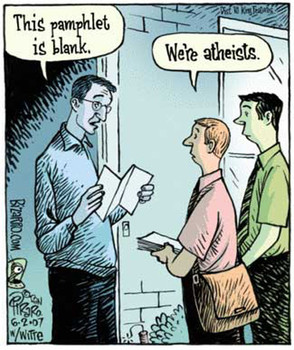Are Atheists Playing Fair?
As a Christian, you may have had this happen to you:
An atheist challenges your beliefs. You give an explanation and share evidence that points to why you believe in a Creator. They find nothing you are saying convincing. You fire back and challenge the atheist on their beliefs. After all, they have been arguing that we live in a universe that came into existence without an intelligent cause. Let’s see what they got.
Now you find yourself in a perplexing situation. Just a moment ago the atheist demanded that you give good and convincing reasons for your system of beliefs. But when asking the atheist to defend their system of beliefs, the atheist argues that their is no burden of proof on them to support anything. In fact the atheist swears that she isn’t even making a claim at all. She is merely rejecting your claim that “God exists.” The burden of proof then is on you–on Christians.
Is that true? Are atheists not making any claims about God? Is burden of proof on Theists alone? They demand that we have support for our claims, but then they dodge our questions. Is this fair? Let’s examine it for a second.
Until recently, no one ever questioned that atheists were affirming a position–that is “no god(s) exist.” Now, there is a “new atheism” that says atheists merely disbelieve or reject evidence of God. They echo Christopher Hitchens that atheism, “is rejecting that a certain proposition is true” and “is NOT asserting that a certain proposition is false.” They think that means they can criticize one group’s beliefs and their reasons for believing them and not be obligated to abide by their own rules.
This is a clever move that works too often, but as you’ll see it’s not fair or even logical. Atheists are contradicting themselves and here’s why:
TRY TACTIC 1:
If atheism is merely rejecting that a certain proposition is true, “God exists,” then if that proposition is false, we know that it must be true that “God does not exist.” These are called logically equivalent claims. Seems elementary doesn’t it?
If you present that to the atheist and it doesn’t click try explaining it this way:
TRY TACTIC 2:
Look at the letter A. Let’s make a claim that “A is symmetrical.” We run tests on the letter and discover, YES, A is symmetrical. That claim is TRUE.
Let’s try another letter, Q. If the “claim of symmetry,” when applied to the letter Q, is not true, then we can reject that claim, but we can also say that it is TRUE that Q is “A-Symmetrical.”
Apply this to atheism…
It is NOT the case that we merely lack belief in Q’s symmetry or “reject the claim that Q is symmetrical.” The case is that we can actually positively affirm that Q is A-Symmetrical! Hitchens and those who echo his sentiment are disillusioned.
CONCLUSION
I hate to break it to the atheists, but you ARE making a claim and that claim is, “there is no God.” Hitchens was wrong. Yes, atheists are rejecting that a certain proposition is true. But they are also emphatically asserting that a certain proposition (Theism) is false and are thereby making the logically equivalent claim that Atheism is true. Furthermore, as they love to point out to Christians, for this claim to be substantiated there must be some supporting evidence. You don’t give us a free pass and neither do we give you one. The statement that “there is no burden of proof on atheists to substantiate their claims because they aren’t making a claim,” is obviously fallacious.




Leave a Reply
Want to join the discussion?Feel free to contribute!